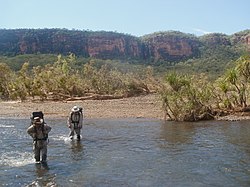Carson River (Western Australia)

| Carson River | |
|---|---|
 | |
 | |
| Location | |
| Country | Australia |
| Physical characteristics | |
| Source | |
| • location | below Foster Range |
| • elevation | 300 metres (984 ft)[1] |
| Mouth | |
• location | King Edward River |
• elevation | 36 metres (118 ft) |
| Length | 155 kilometres (96 mi) |
The Carson River is a river in the Kimberley region of Western Australia.
The headwaters of the river rise at the base of the Foster Range near the southwestern edge of the Drysdale River National Park. The river flows in a northerly direction along the Carson Escarpment and discharges into the King Edward River near Aragoon, about 12 kilometres (7 mi) south of Kalumburu.
The river has four tributaries, including Morgan River, Swida Creek and Pronga-Marie Creek. The river was named in 1886 by the explorer Charles Burrowes while surveying the area for the Victoria Squatting Company. He named it after the chairman of the company, David Carson.[2][3][4] The river contains several permanent pools where examples of Indigenous Australian art, known as the Gwion Gwion rock paintings, can be found along the cliff faces.[5]
The traditional owners of the areas around the river are the Wilawila, Miwa and Wunambal peoples.[6]
References
- ^ "Bonzle Digital Atlas – Map of Carson River". 2009. Retrieved 12 March 2009.
- ^ "The Cambridge Downs Country". The West Australian. Perth, WA. 26 July 1886. p. 3. Retrieved 23 April 2020.
- ^ "Drysdaliana". The Herald. Melbourne. 1 September 1945. p. 4. Retrieved 23 April 2020.
- ^ "News and notes". The West Australian. Perth, WA. 18 October 1886. p. 3. Retrieved 23 April 2020.
- ^ "Bradshaw Foundation - Rock Art Archives". 2010. Retrieved 2 July 2011.
- ^ "Ausanthrop - Australian Aboriginal tribal database". 2012. Archived from the original on 27 September 2015. Retrieved 30 April 2012.
14°25′59″S 126°38′04″E / 14.43306°S 126.63444°E
